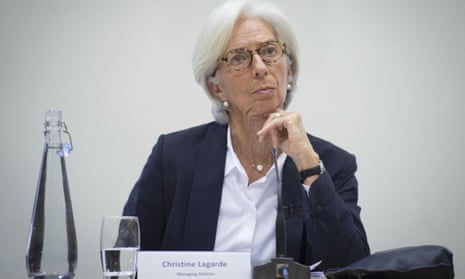The International Monetary Fund has strongly defended its gloomy forecasts for the UK after Brexit, saying pre-referendum warnings of slower growth were coming true.
Christine Lagarde, the fund’s managing director, said the vote to leave the EU in June 2016 was already having an impact and Britain’s weaker growth this year was in contrast to accelerating activity in the rest of the world.
Speaking at the Treasury as the IMF announced the results of its annual health check of the UK economy, Lagarde hit back at those who lambasted the fund when predictions of an immediate post-referendum recession failed to come to pass.
“We feared that if Britain decided to leave, it would most likely entail a depreciation of sterling, higher inflation leading to a squeeze on disposable income and a reduction in investment,” she said.
“People said ‘Oh those experts’, but we are seeing the narrative we identified as a potential risk being rolled out as we speak. This is not the experts speaking, it’s what the economy is demonstrating.”
The IMF trimmed its forecast for UK growth this year from 1.7% in October to 1.6%, and said it expected the economy to grow by 1.5% in 2018.
It was one of several economic forecasters to say the UK would suffer a downturn should voters back leaving the EU.
Last year, the fund had said growth for 2017 would be 1.1%, before raising the forecast to 2%.Since the turn of the year, Lagarde said activity had slowed notably and the UK’s recent performance was a disappointment in the light of the best showing by the global economy since the financial crash.
The TUC general secretary, Frances O’Grady, said: “This shows that Brexit uncertainty has already harmed family budgets. Jobs and living standards must be the priority when deciding the best Brexit option for Britain. The government should keep single market membership on the negotiating table.”Lagarde said she welcomed the recent breakthrough in talks between Britain and the EU over citizens’ rights, Northern Ireland and the financial settlement, but said it was important for the final deal to minimise the erection of trade barriers and provide adequate time to implement changes.
The fund’s article IV consultation stressed that Britain faces huge uncertainty as it embarks on the ambitious task of negotiating an exit from the EU.
The Washington-based lender of last resort said despite recent progress, there remained a risk of the UK crashing out of the EU without a deal and suffering a drop in commercial property prices and a credit crunch in financial markets.
Outlining its concerns, the IMF said a breakdown in discussions “could lead to a disorderly exit from the EU and sharp falls in asset prices”, while the list of tasks that remains to be accomplished “is very long and the timeframe to do so is ambitious”.
“The list of tasks … include agreeing on a trade deal with the EU, negotiating new arrangements with about 60 countries to replace those to which the UK is currently party via its membership in the EU, bolstering human and IT resources in customs and other services, and translating many thousands of pages of EU law into UK domestic statute,” it said.
Brexit offered the opportunity “to reshape the structure of the UK economy”, but the impact of regulatory barriers could harm car manufacturers and the finance industry, the fund said.
“The financial sector, which represents about 7% of GDP but accounts for about 10% of tax revenues and 14% of exports, may be particularly affected in the absence of an agreement that allows the majority of EU-facing financial services currently provided from the UK to remain there,” the report said.
“Manufacturing firms with complex and lengthy international supply chains, such as in the automobile industry, could also face significant challenges. These developments could also have a significant impact on productivity growth.”
The report also gave support to the government’s plans for bringing down the annual deficit over the next five years.
It said austerity budgets were necessary to repair the damage to Britain’s finances following the financial crash in 2008. But the fund questioned the Treasury’s reliance on spending cuts to reduce the deficit, saying tax increases should be considered as part of further measures.
Philip Hammond has struggled to persuade the Conservatives that higher taxes are needed along with spending cuts to bring down the deficit.
John McDonnell, Labour’s shadow chancellor, said the IMF report showed that Conservative governments were “good at cutting public services to give tax cuts to a wealthy few, but hopeless at investing in the skills and infrastructure our country needs to develop an economy for the many”.
He added: “Austerity has failed and will only continue to undermine our economy during the Brexit negotiations.”










Comments (…)
Sign in or create your Guardian account to join the discussion